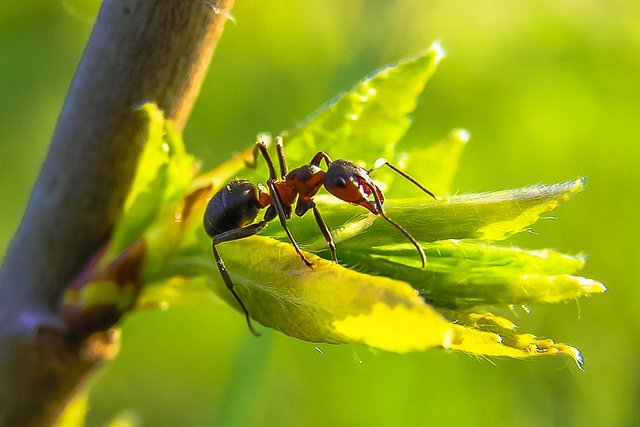
Hello friends, how are you all, how is your investment portfolio, I hope everything is fine. Back again with me, this time I want to write about ants. Here is a brief review from me
Ants are social insects that live in large colonies. The breeding process of ants involves several main stages:
Nest Site Selection: Ant colonies usually start new nests by sending groups of workers to find a suitable location. After finding a suitable location, they returned to the old colony to bring the information.
Queen Selection: The new nest will be inhabited by the queen ant who is responsible for laying eggs. The queen ant is the only one responsible for producing eggs in the colony, which can reach thousands of eggs per day.
Egg Care and Development: The eggs laid by the queen will be cared for by ant workers in the nest. They ensure that the eggs remain protected and cared for until they hatch.
Larva and Pupa Stage: After hatching, ant larvae require intensive care. They do not move and depend on workers for food and care.
Care and Development of Workers: After passing through the larval and pupal stages, ants undergo metamorphosis into workers, who are responsible for various tasks in the colony such as finding food, caring for the larvae, and defending the nest.
Queen Rearing and Reproduction: Ant queens continue to lay eggs throughout their lives. Ant workers are also tasked with caring for and protecting them so that the colony continues to grow.
This process indicates a high level of organization in ant colonies, where each member has a clear role in supporting the survival and growth of their population.

Ants survive
Ants have various strategies that help them survive in their environment:
Communication: Ants use pheromones and touch signals to communicate with other colony members. This helps them coordinate activities such as finding food, protecting the nest, and dealing with threats.
Cooperation in Colonies: Ants are social insects that live in structured colonies. They work together to find food, care for the larvae, and defend the nest. A clear division of labor allows them to function as one strong unit.
Activity Synchronization: Ants have the ability to synchronize their activities based on external stimuli such as changes in weather or new food sources. They can adapt quickly to environmental changes.
Food Search: Ants have the ability to find different food sources, from sweet plants to small insects. They use pheromone trails to mark routes to food and share information with other colony members.
Colony Defense: When their nest is threatened, ants can organize colony defense quickly. Some species of ants use bites or spray defensive substances to protect themselves from predators or attacks by other insects.
Adaptation to the Environment: Ants have the ability to adapt to various environmental conditions, such as extreme temperatures or drought. Some species of ants can also make their nests in different places, such as in the ground, under rocks, or even in trees.
With a combination of these strategies, ants can survive successfully in a variety of habitats and overcome the challenges they face every day.
Thank you, I hope it is useful for all of us, my greetings @achysteem
Thank you, friend!


I'm @steem.history, who is steem witness.
Thank you for witnessvoting for me.
please click it!
(Go to https://steemit.com/~witnesses and type fbslo at the bottom of the page)
The weight is reduced because of the lack of Voting Power. If you vote for me as a witness, you can get my little vote.
Downvoting a post can decrease pending rewards and make it less visible. Common reasons:
Submit
Upvoted! Thank you for supporting witness @jswit.
Downvoting a post can decrease pending rewards and make it less visible. Common reasons:
Submit
Downvoting a post can decrease pending rewards and make it less visible. Common reasons:
Submit
Upvoted. Thank You for sending some of your rewards to @null. It will make Steem stronger.
Downvoting a post can decrease pending rewards and make it less visible. Common reasons:
Submit